Journal of Southern Medical University ›› 2025, Vol. 45 ›› Issue (4): 774-784.doi: 10.12122/j.issn.1673-4254.2025.04.13
Yue CHEN1,2( ), Linyu XIAO1,2, Lü REN1,2, Xue SONG3,5, Jing LI4,5, Jianguo HU4,5(
), Linyu XIAO1,2, Lü REN1,2, Xue SONG3,5, Jing LI4,5, Jianguo HU4,5( )
)
Received:2024-09-09
Online:2025-04-20
Published:2025-04-28
Contact:
Jianguo HU
E-mail:cyue0308@163.com;jghu9200@bbmc.edu.cn
Supported by:Yue CHEN, Linyu XIAO, Lü REN, Xue SONG, Jing LI, Jianguo HU. Monotropein improves motor function of mice with spinal cord injury by inhibiting the PI3K/AKT signaling pathway to suppress neuronal apoptosis[J]. Journal of Southern Medical University, 2025, 45(4): 774-784.
Add to citation manager EndNote|Ris|BibTeX
URL: https://www.j-smu.com/EN/10.12122/j.issn.1673-4254.2025.04.13
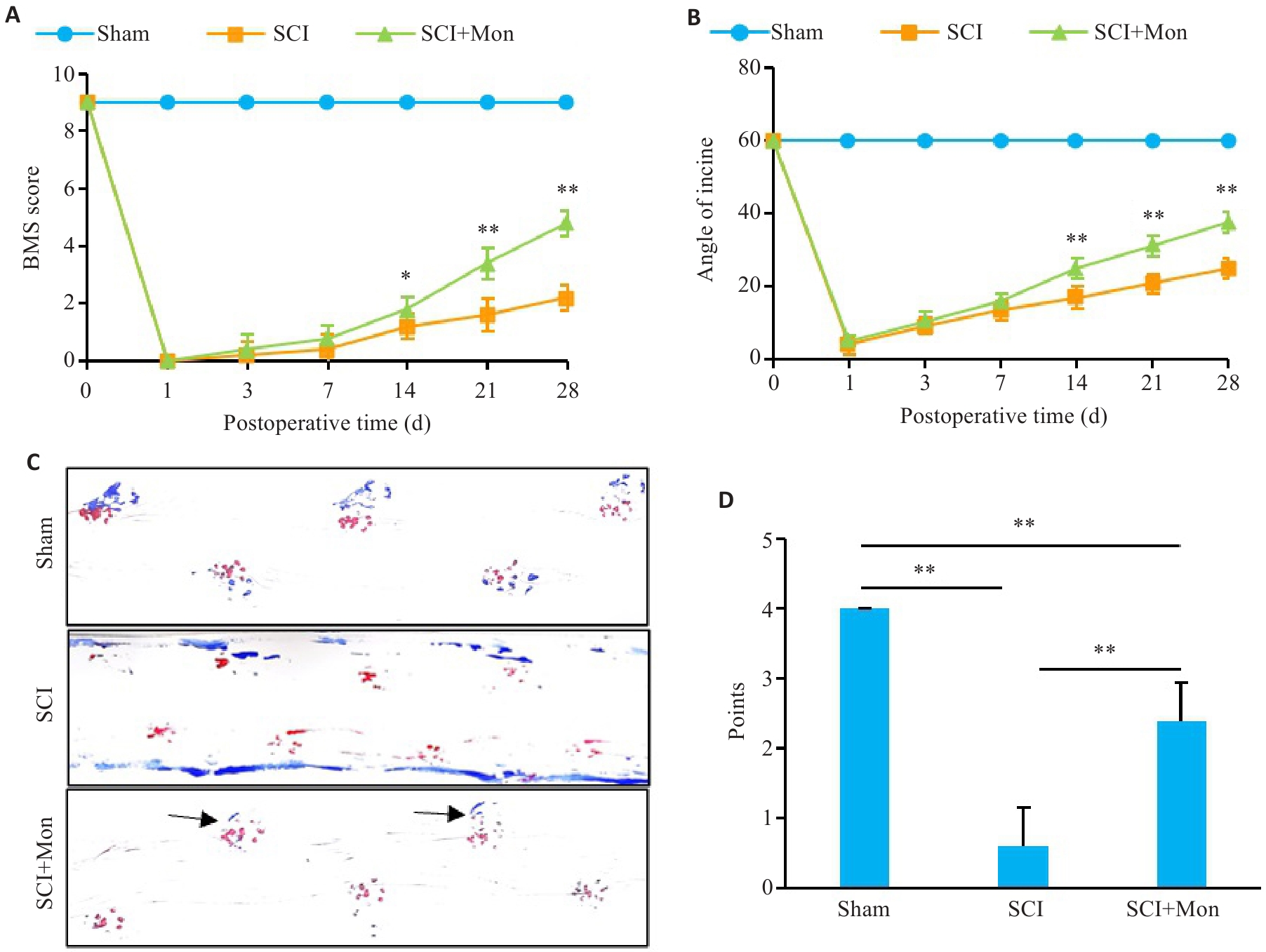
Fig.1 Assessment of motor function in monotropein (Mon)-treated mice with spinal cord injury (SCI). A: BMS Scoring. B: Inclined plane test. *P<0.05, **P<0.01 vs SCI. C,D: Footprint analysis 28 days after injury. blak arrows indicate normal hind leg tracks. (n=5). *P<0.05, **P<0.01.
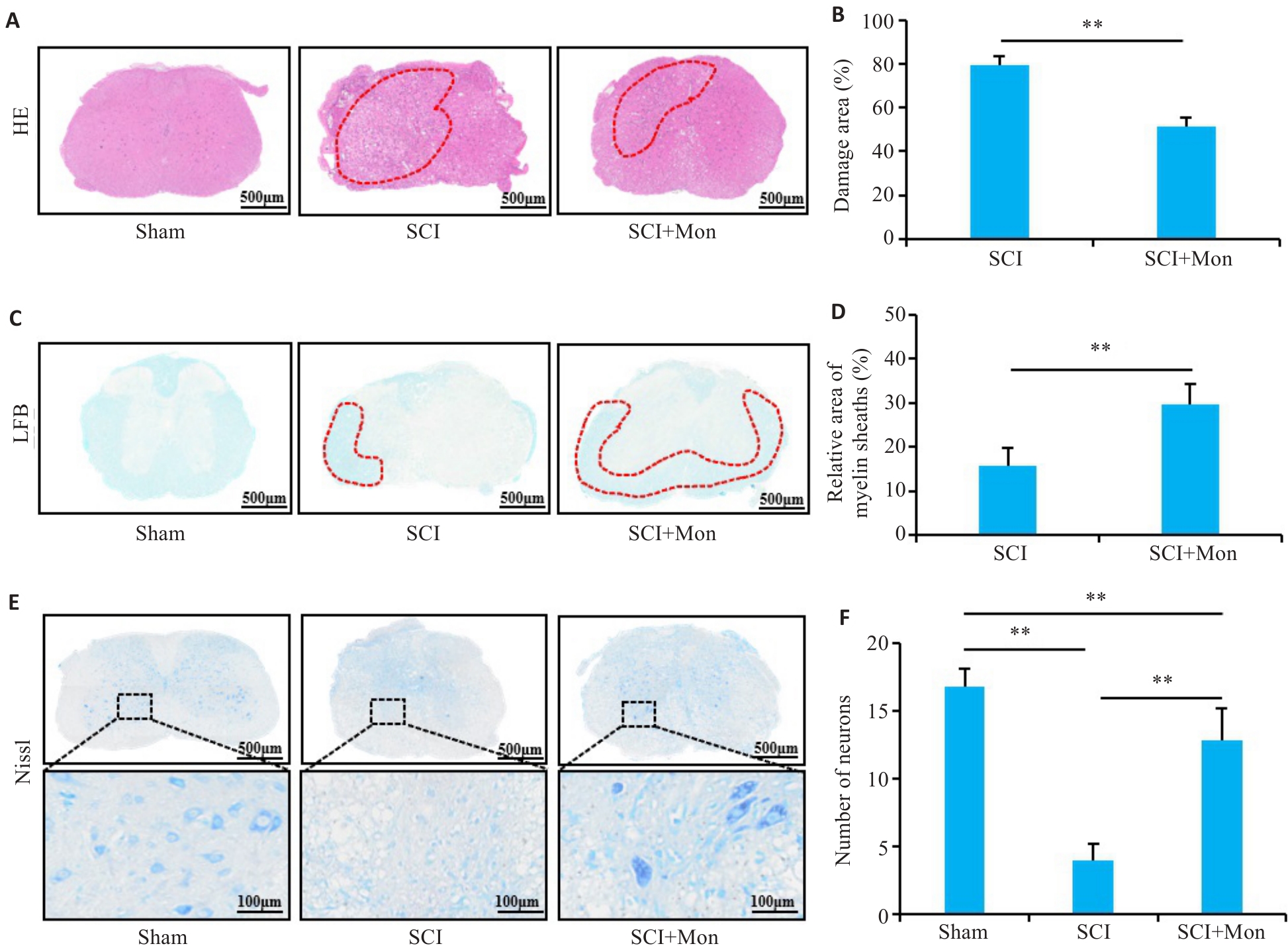
Fig.2 Monotropein reduces lesion area, increases residual myelin, and inhibits motor neuron loss in SCI mice. A: HE staining of mouse spinal cord cross-sections at the injury site in the 3 groups. B: Quantitative analysis of lesion area at the injury site. C: LFB staining of mouse spinal cord cross-sections at the injury site in the 3 groups. D: Quantitative analysis of residual myelin. E: Nissl staining of neurons of mouse spinal cord cross-sections from 0.5 mm rostral to injury site center in the 3 groups. F: Quantitative analysis of residual number of motor neurons (n=5). **P<0.01.
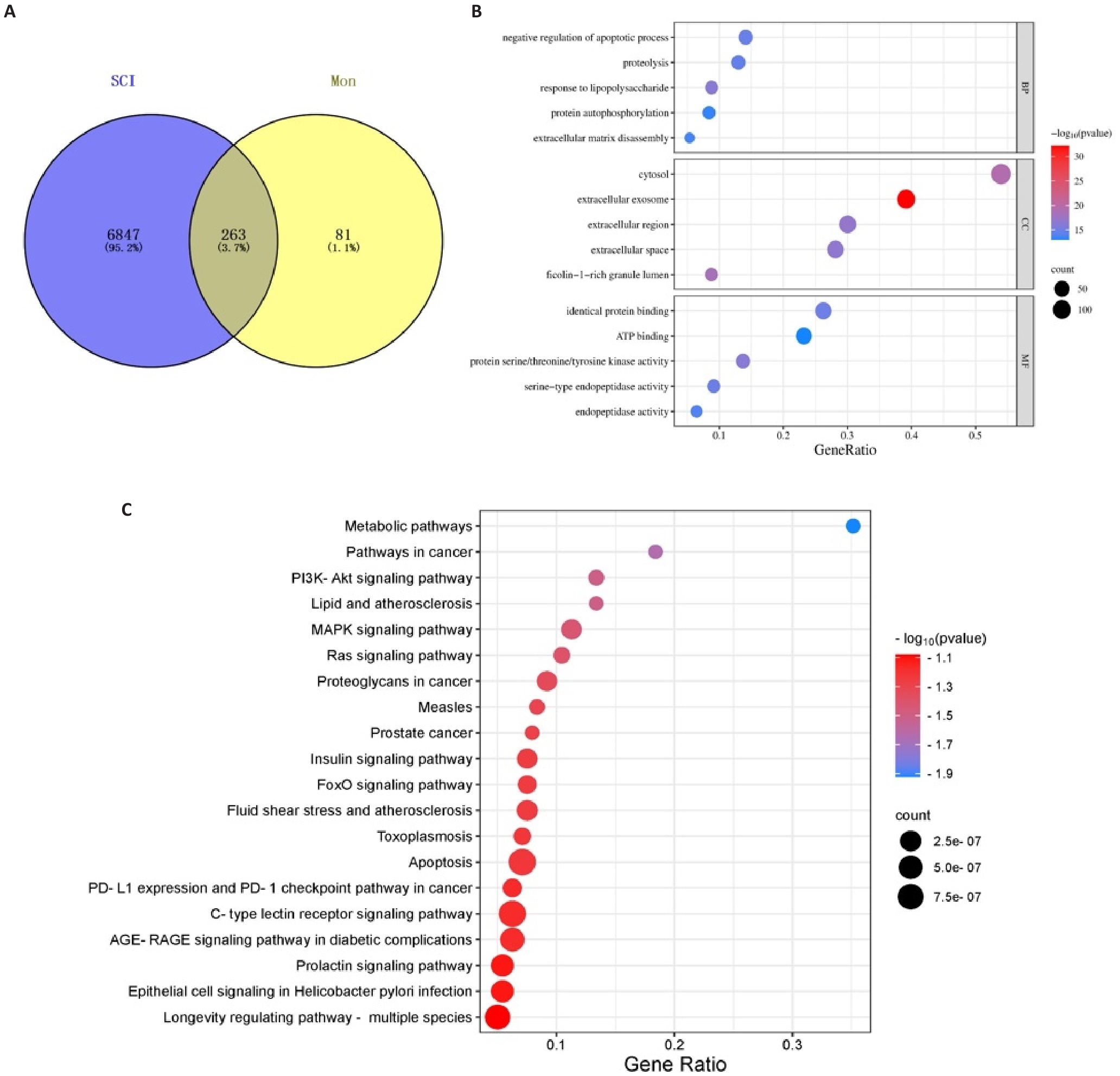
Fig.3 GO functional enrichment and KEGG pathway enrichment analyses of the function and mechanism of monotropein. A: Prediction of the target proteins of monotropein using network pharmacology analysis. B: GO enrichment analysis. C: KEGG enrichment analysis.
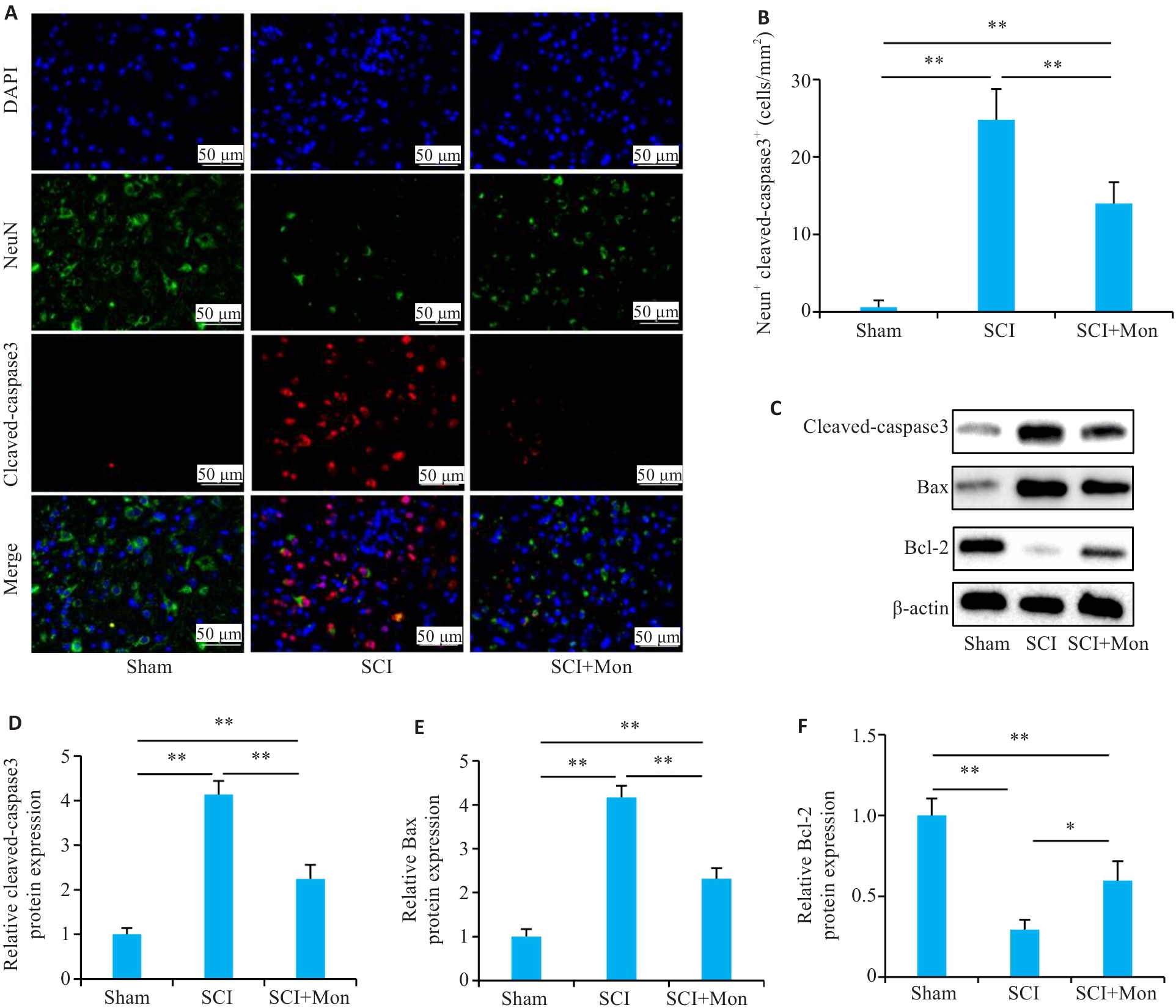
Fig.4 Monotropein ameliorates neuronal apoptosis in SCI mice. A: NeuN (green) and cleaved caspase-3 (red) fluorescence costaining in mouse spinal cord tissue from the 3 groups. B: Quantification of the number of apoptotic neurons. C: Expression of apoptotic proteins in the spinal cord of the mice detected by Western blotting. D-F: Quantitative analysis of apoptotic protein expressions (n=5). *P<0.05, **P<0.01.
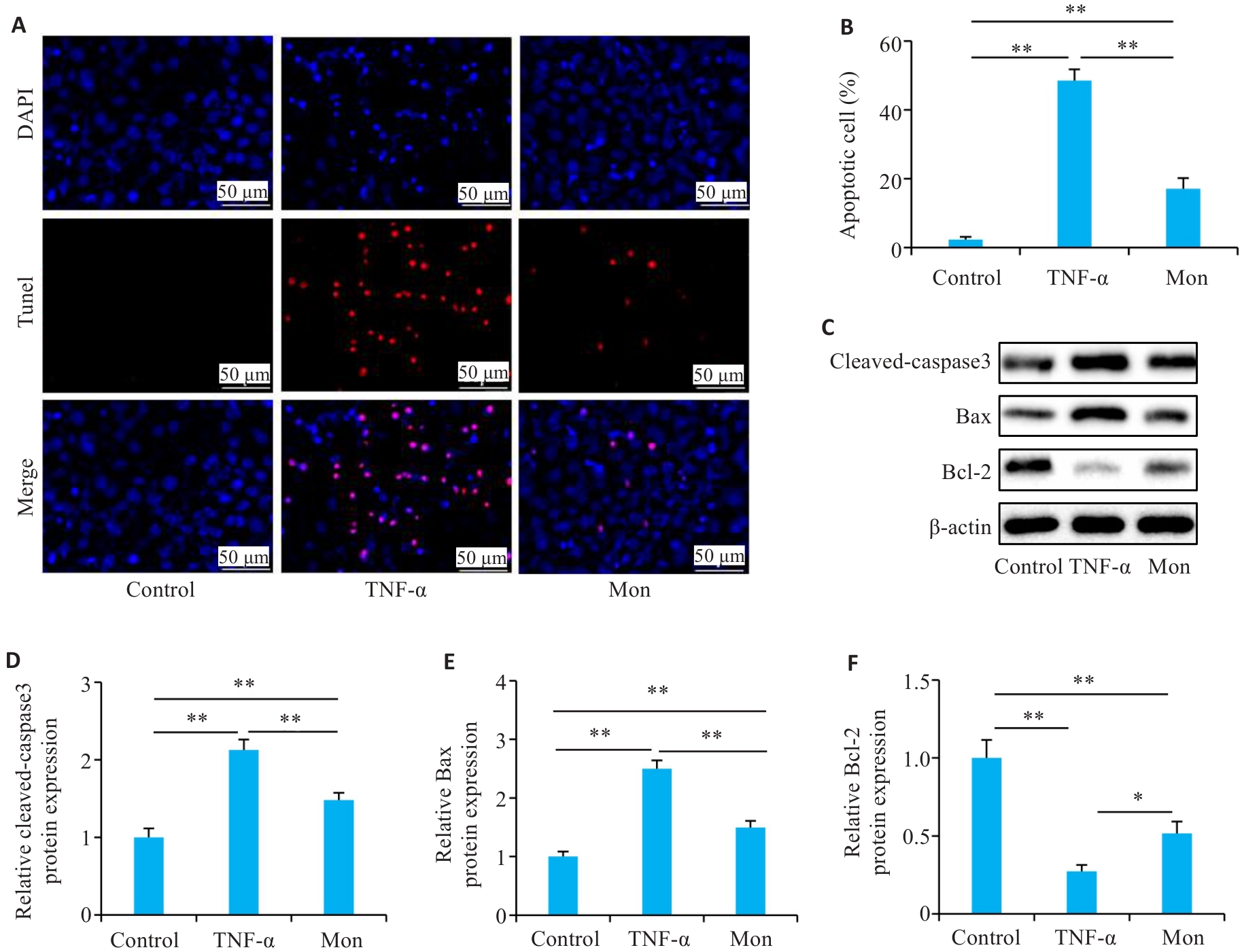
Fig.5 Monotropein ameliorates HT22 cell apoptosis induced by TNF-α. A: TUNEL staining for analyzing apoptosis in HT22 cells. B: Quantitative analysis of the percentage of TUNEL staining-positive cells. C: Western blotting for detection of apoptotic protein expression. D-F: Quantification of cleaved caspase-3, Bax, and Bcl-2 protein expression (n=3). *P<0.05, **P<0.01.
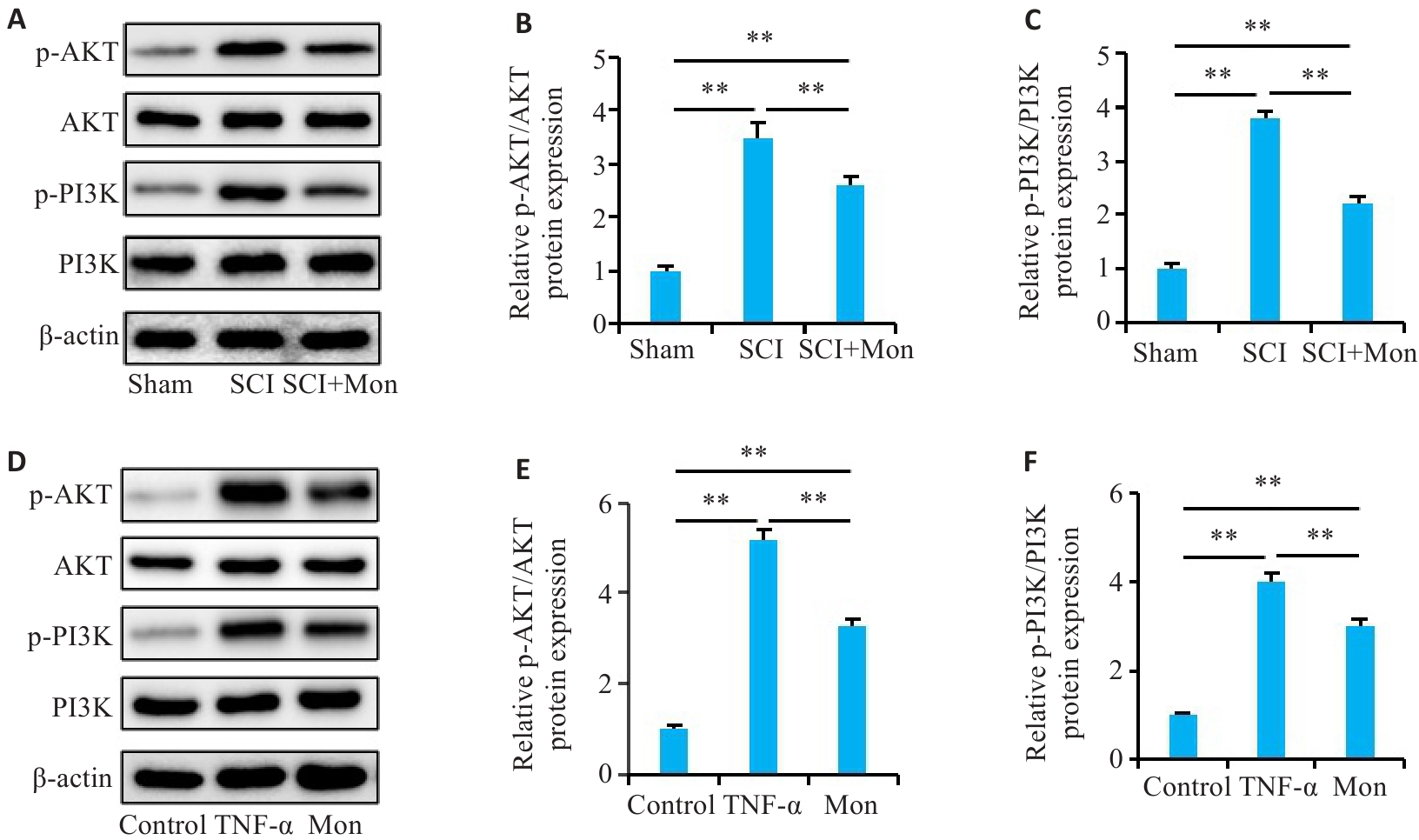
Fig.6 Effect of monotropein on expressions of PI3K/AKT signaling pathway proteins in the spinal cord tissue of SCI mice and in HT22 cells detected using Western blotting. A: Protein bands in the 3 groups. B, C: Quantitative analysis of p-PI3K and p-AKT protein expressions in SCI mice. D: Western blotting of PI3K/AKT signaling pathway protein expressions in HT22 cells. E, F: Quantitative analysis of p-PI3K and p-AKT protein expressions in HT22 cells (n=3). **P<0.01.
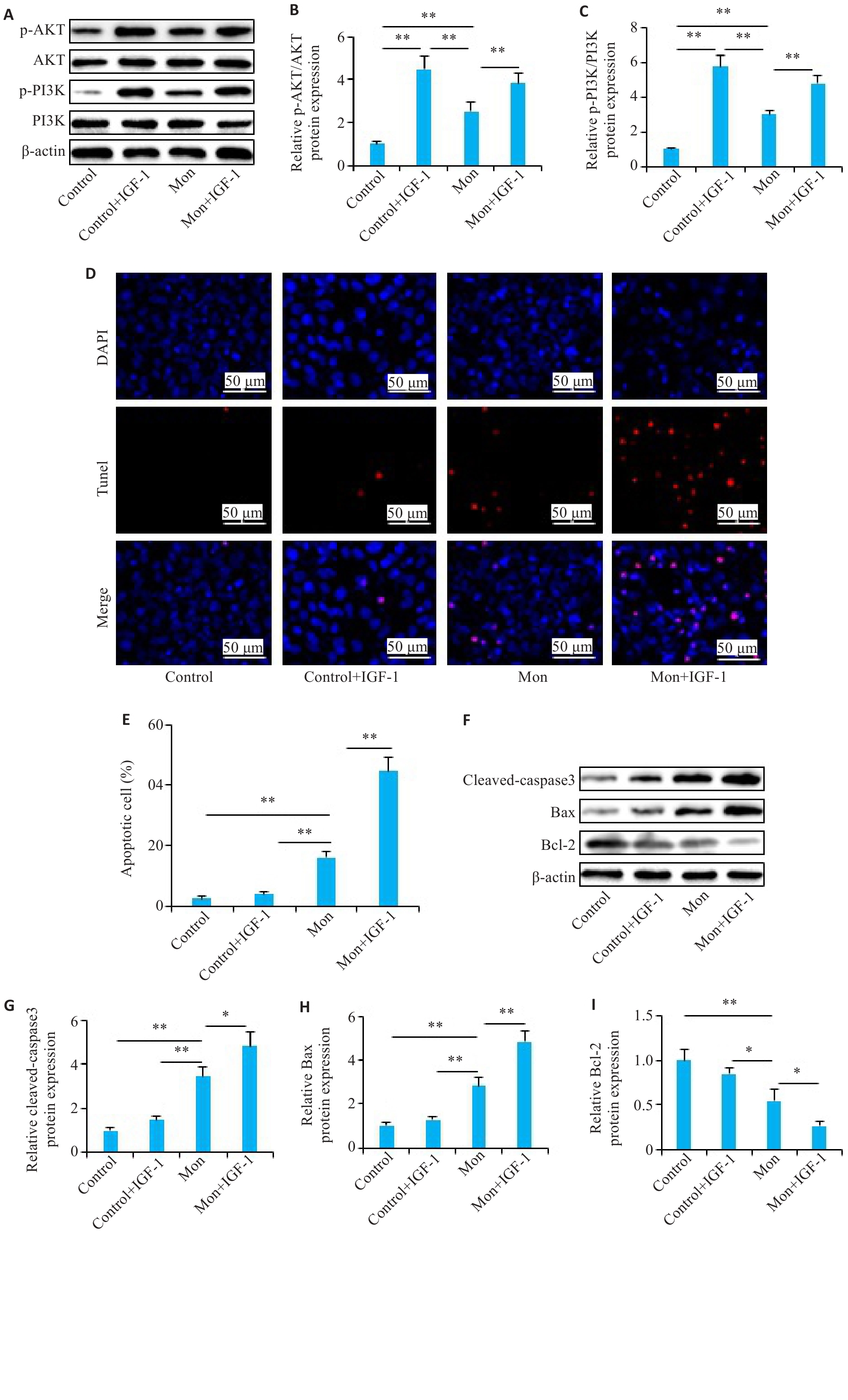
Fig.7 Monotropein alleviates neuronal apoptosis by inhibiting PI3K/AKT signaling pathway. A: Western blotting for assessment of PI3K/AKT signaling pathway protein expressions in HT22 cells. B, C: Quantitative evaluation of p-PI3K and p-AKT protein levels in HT22 cells. D: TUNEL staining of HT22 cells. E: Quantitative analysis of the percentage of TUNEL staining positive cells. F: Expression of apoptotic protein in HT22 cells. G-I: Quantitative analysis of cleaved caspase-3, Bax, and Bcl-2 protein levels in HT22 cells (n=3). *P<0.05, **P<0.01.
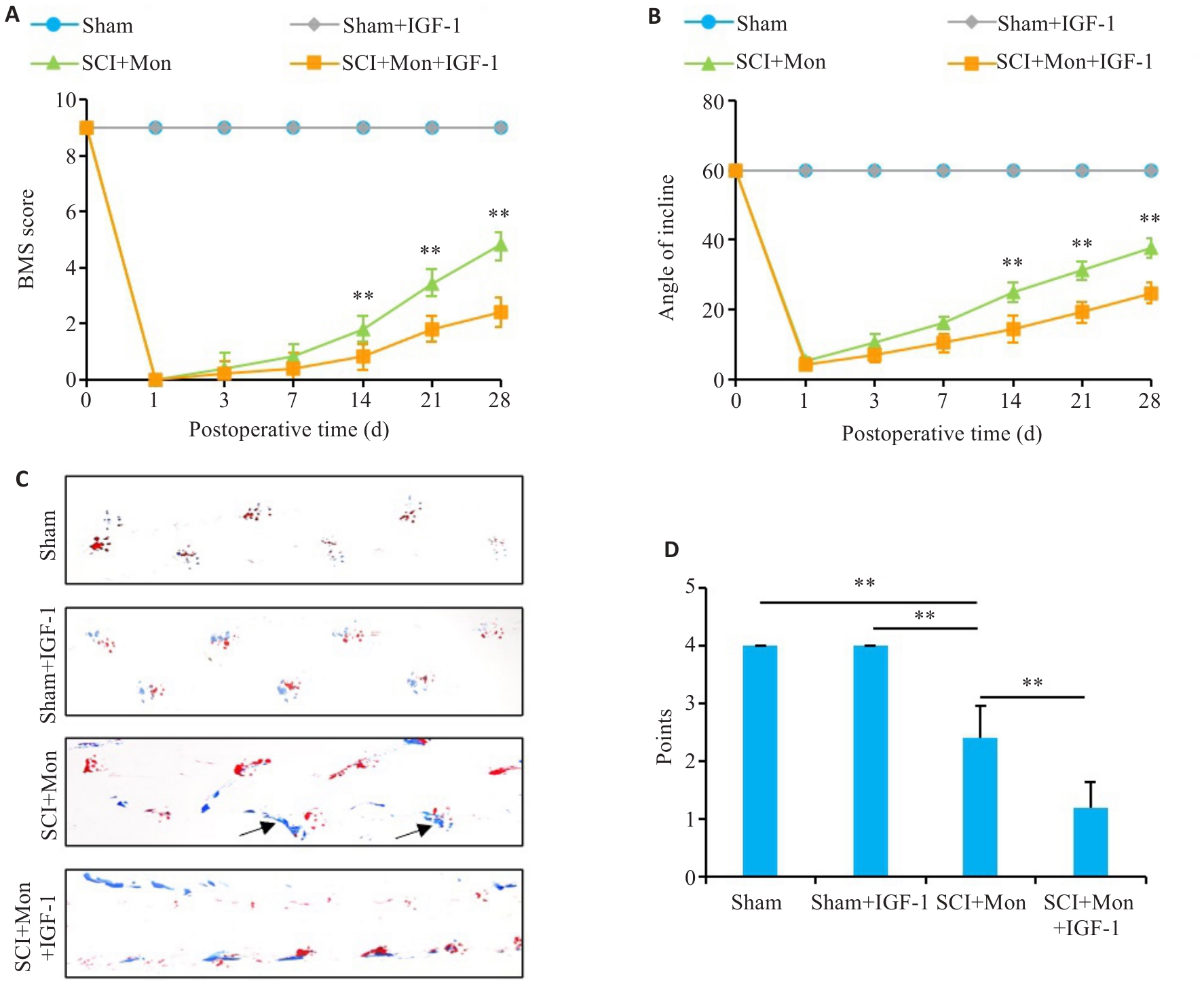
Fig.8 Monotropein promotes motor function recovery in SCI mice by inhibiting the PI3K/AKT signaling pathway. A: BMS scoring. B: Inclined plane test. **P<0.01 vs SCI+Mon+IGF-1. C, D: Footprint analysis 28 days after injury (n=5). **P<0.01.
| 1 | Wang XZ, Niu XF, Wang YK, et al. C-C motif chemokine ligand 2/C-C motif chemokine receptor 2 pathway as a therapeutic target and regulatory mechanism for spinal cord injury[J]. Neural Regen Res, 2025, 20(8): 2231-44. |
| 2 | Quadri SA, Farooqui M, Ikram A, et al. Recent update on basic mechanisms of spinal cord injury[J]. Neurosurg Rev, 2020, 43(2): 425-41. |
| 3 | Li J, Huang L, Yu LT, et al. Feruloylated oligosaccharides alleviate central nervous inflammation in mice following spinal cord contusion[J]. J Agric Food Chem, 2020, 68(52): 15490-500. |
| 4 | Chen YQ, Wang SN, Shi YJ, et al. CRID3, a blocker of apoptosis associated speck like protein containing a card, ameliorates murine spinal cord injury by improving local immune microenvironment[J]. J Neuroinflammation, 2020, 17(1): 255. |
| 5 | Zhu B, Gu GJ, Ren J, et al. Schwann cell-derived exosomes and methylprednisolone composite patch for spinal cord injury repair[J]. ACS Nano, 2023, 17(22): 22928-43. |
| 6 | Liu ZY, Yang Y, He L, et al. High-dose methylprednisolone for acute traumatic spinal cord injury: a meta-analysis[J]. Neurology, 2019, 93(9): e841-50. |
| 7 | Zhao R, Wu X, Bi XY, et al. Baicalin attenuates blood-spinal cord barrier disruption and apoptosis through PI3K/Akt signaling pathway after spinal cord injury[J]. Neural Regen Res, 2022, 17(5): 1080-7. |
| 8 | Ji R, Hao ZZ, Wang H, et al. Fisetin promotes functional recovery after spinal cord injury by inhibiting microglia/macrophage M1 polarization and JAK2/STAT3 signaling pathway[J]. J Agric Food Chem, 2024, 72(32): 17964-76. |
| 9 | Choi J, Lee KT, Choi MY, et al. Antinociceptive anti-inflammatory effect of Monotropein isolated from the root of Morinda officinalis [J]. Biol Pharm Bull, 2005, 28(10): 1915-8. |
| 10 | 丁其莹, 刘鑫源, 覃佳运, 等. 基于药理学分析巴戟天治疗阿尔茨海默病的机制[J]. 食品工业科技, 2024, 45(16): 36-46. |
| 11 | 冯鸿耀, 曾令杰, 黄 涵, 等. 巴戟天根、茎、叶中甲基异茜草素、水晶兰苷、多糖的分布与积累研究[J]. 华西药学杂志, 2017, 32(2): 208-10. |
| 12 | Li Z, Chen ZY, Chen JY, et al. Monotropein attenuates apoptosis and pyroptosis in chondrocytes and alleviates osteoarthritis progression in mice[J]. Chin Med, 2023, 18(1): 42. |
| 13 | Zhou KL, Zheng ZL, Li Y, et al. TFE3, a potential therapeutic target for Spinal Cord Injury via augmenting autophagy flux and alleviating ER stress[J]. Theranostics, 2020, 10(20): 9280-302. |
| 14 | Zhang YP, Chen YE, Li BX, et al. The effect of monotropein on alleviating cisplatin-induced acute kidney injury by inhibiting oxidative damage, inflammation and apoptosis[J]. Biomed Pharmacother, 2020, 129: 110408. |
| 15 | Zhao X, Bausano B, Pike BR, et al. TNF-alpha stimulates caspase-3 activation and apoptotic cell death in primary septo-hippocampal cultures[J]. J Neurosci Res, 2001, 64(2): 121-31. |
| 16 | 许轶博, 孙 洋, 肖林雨, 等. 紫菀酮对小鼠脊髓损伤后神经元凋亡的影响[J]. 中国医学科学院学报, 2023, 45(5): 703-12. |
| 17 | Michele Basso D, Fisher LC, Anderson AJ, et al. Basso Mouse Scale for locomotion detects differences in recovery after spinal cord injury in five common mouse strains[J]. J Neurotrauma, 2006, 23(5): 635-59. |
| 18 | Wang C, Zhang L, Ndong JC, et al. Progranulin deficiency exacerbates spinal cord injury by promoting neuroinflammation and cell apoptosis in mice[J]. J Neuroinflammation, 2019, 16(1): 238. |
| 19 | Xu YB, Geng ZJ, Sun Y, et al. Complanatuside A improves functional recovery after spinal cord injury through inhibiting JNK signaling-mediated microglial activation[J]. Eur J Pharmacol, 2024, 965: 176287. |
| 20 | 肖林雨, 段 婷, 夏勇生, 等. 蒙花苷通过抑制TLR4/NF-κB通路抑制小鼠脊髓损伤后小胶质细胞活化介导的神经炎症和神经元凋亡[J]. 南方医科大学学报, 2024, 44(8): 1589-98. |
| 21 | Wu MQ, Lai HB, Peng W, et al. Monotropein: a comprehensive review of biosynthesis, physicochemical properties, pharmaco-kinetics, and pharmacology[J]. Front Pharmacol, 2023, 14: 1109940. |
| 22 | Zhang JH, Xin HL, Xu YM, et al. Morinda officinalis How. -A comprehensive review of traditional uses, phytochemistry and pharmacology[J]. J Ethnopharmacol, 2018, 213: 230-55. |
| 23 | 邹连勇, 张鸿燕. 巴戟天寡糖抗抑郁作用的研究进展[J]. 中国新药杂志, 2012, 21(16): 1889-91, 1945. |
| 24 | Jiang J, Pan H, Shen F, et al. Ketogenic diet alleviates cognitive dysfunction and neuroinflammation in APP/PS1 mice via the Nrf2/HO-1 and NF-κB signaling pathways[J]. Neural Regen Res, 2023, 18(12): 2767-72 . |
| 25 | Ma SF, Chen YJ, Zhang JX, et al. Adoptive transfer of M2 macrophages promotes locomotor recovery in adult rats after spinal cord injury[J]. Brain Behav Immun, 2015, 45: 157-70. |
| 26 | Mi XD, Ni CT, Zhao JT, et al. P2Y12 receptor mediates apoptosis and demyelination to affect functional recovery in mice with spinal cord injury[J]. Neurochem Int, 2023, 171: 105641. |
| 27 | 赵东方, 尉志强, 邢姝琴, 等. 巴戟天对骨关节炎小鼠软骨细胞自噬、凋亡的影响及机制[J]. 新乡医学院学报, 2023, 40(11): 1001-7. |
| 28 | Zhu FB, Wang JY, Zhang YL, et al. Mechanisms underlying the antiapoptotic and anti-inflammatory effects of monotropein in hydrogen peroxide-treated osteoblasts[J]. Mol Med Rep, 2016, 14(6): 5377-84. |
| 29 | Qian ZY, Chang J, Jiang F, et al. Excess administration of miR-340-5p ameliorates spinal cord injury-induced neuroinflammation and apoptosis by modulating the P38-MAPK signaling pathway[J]. Brain Behav Immun, 2020, 87: 531-42. |
| 30 | Singh R, Letai A, Sarosiek K. Regulation of apoptosis in health and disease: the balancing act of BCL-2 family proteins[J]. Nat Rev Mol Cell Biol, 2019, 20(3): 175-93. |
| 31 | Gabellini C, Trisciuoglio D, Del Bufalo D. Non-canonical roles of bcl-2 and bcl-xL proteins: relevance of BH4 domain[J]. Carcino-genesis, 2017, 38(6): 579-87. |
| 32 | Yao RB, Ren LR, Wang SY, et al. Euxanthone inhibits traumatic spinal cord injury via anti-oxidative stress and suppression of p38 and PI3K/Akt signaling pathway in a rat model[J]. Transl Neurosci, 2021, 12(1): 114-26. |
| 33 | Xiao CL, Yin WC, Zhong YC, et al. The role of PI3K/Akt signalling pathway in spinal cord injury[J]. Biomed Pharmacother, 2022, 156: 113881. |
| 34 | Cui F, He X. IGF-1 ameliorates streptozotocin-induced pancreatic β cell dysfunction and apoptosis via activating IRS1/PI3K/Akt/FOXO1 pathway[J]. Inflamm Res, 2022, 71(5/6): 669-80. |
| 35 | Rong L, Li ZD, Leng X, et al. Salidroside induces apoptosis and protective autophagy in human gastric cancer AGS cells through the PI3K/Akt/mTOR pathway[J]. Biomed Pharmacother, 2020, 122: 109726. |
| [1] | Yanyan DONG, Kejing ZHANG, Jun CHU, Quangen CHU. Didang Decoction-medicated serum enhances autophagy in high glucose-induced rat glomerular endothelial cells via the PI3K/Akt/mTOR signaling pathway [J]. Journal of Southern Medical University, 2025, 45(3): 461-469. |
| [2] | Di CHEN, Ying LÜ, Yixin GUO, Yirong ZHANG, Ruixuan WANG, Xiaoruo ZHOU, Yuxin CHEN, Xiaohui WU. Dihydroartemisinin enhances doxorubicin-induced apoptosis of triple negative breast cancer cells by negatively regulating the STAT3/HIF-1α pathway [J]. Journal of Southern Medical University, 2025, 45(2): 254-260. |
| [3] | Ju HUANG, Lixia YIN, Minzhu NIU, Zhijun GENG, Lugen ZUO, Jing LI, Jianguo HU. Nodakenin ameliorates TNBS-induced experimental colitis in mice by inhibiting pyroptosis of intestinal epithelial cells [J]. Journal of Southern Medical University, 2025, 45(2): 261-268. |
| [4] | Haonan¹ XU, Fang³ ZHANG, Yuying² HUANG, Qisheng⁴ YAO, Yueqin⁴ GUAN, Hao CHEN. Thesium chinense Turcz. alleviates antibiotic-associated diarrhea in mice by modulating gut microbiota structure and regulating the EGFR/PI3K/Akt signaling pathway [J]. Journal of Southern Medical University, 2025, 45(2): 285-295. |
| [5] | Yuejiao PEI, Huimin LIU, Yu XIN, Bo LIU. High expression of miR-124 improves cognitive function of sleep-deprived rats by modulating the PI3K/AKT signaling pathway [J]. Journal of Southern Medical University, 2025, 45(2): 340-346. |
| [6] | Yu BIN, Ziwen LI, Suwei ZUO, Sinuo SUN, Min LI, Jiayin SONG, Xu LIN, Gang XUE, Jingfang WU. High expression of apolipoprotein C1 promotes proliferation and inhibits apoptosis of papillary thyroid carcinoma cells by activating the JAK2/STAT3 signaling pathway [J]. Journal of Southern Medical University, 2025, 45(2): 359-370. |
| [7] | Qiaoyan CAI, Yaoyao XU, Yuxing LIN, Haowei LIN, Junpeng ZHENG, Weixiang ZHANG, Chunyu ZHAO, Yupeng LIN, Ling ZHANG. Qingda Granules alleviate brain damage in spontaneously hypertensive rats by modulating the miR-124/STAT3 signaling axis [J]. Journal of Southern Medical University, 2025, 45(1): 18-26. |
| [8] | Junping ZHAN, Shuo HUANG, Qingliang MENG, Wei FAN, Huimin GU, Jiakang CUI, Huilian WANG. Buyang Huanwu Decoction reduces mitochondrial autophagy in rheumatoid arthritis synovial fibroblasts in hypoxic culture by inhibiting the BNIP3-PI3K/Akt pathway [J]. Journal of Southern Medical University, 2025, 45(1): 35-42. |
| [9] | Yuru ZHANG, Lei WAN, Haoxiang FANG, Fangze LI, Liwen WANG, Kefei LI, Peiwen YAN, Hui JIANG. Inhibiting miR-155-5p promotes proliferation of human submandibular gland epithelial cells in primary Sjogren's syndrome by negatively regulating the PI3K/AKT signaling pathway via PIK3R1 [J]. Journal of Southern Medical University, 2025, 45(1): 65-71. |
| [10] | Hanjun ZUO, Zhaoda DUAN, Zhao WANG, Tao GUO, Jinsha SHI, Haolong SHI, Juanjuan LI. Gastrodin improves microglia-mediated inflammatory response after hypoxic-ischemic brain damage in neonatal rats via PI3K/AKT pathway [J]. Journal of Southern Medical University, 2024, 44(9): 1712-1719. |
| [11] | Xueli ZHOU, Hua LI, Qingyu CHEN, Meina JIN, Haibo LI, Wei BAI, Chuxuan JIA, Cuiying WEI. Effects of chronic intermittent hypoxia and reoxygenation on insulin resistance and skeletal muscle miR-27a-3p/PPARγ/IRS1/PI3K/AKT expressions in rats [J]. Journal of Southern Medical University, 2024, 44(9): 1729-1737. |
| [12] | Xianheng ZHANG, Jian LIU, Qi HAN, Yiming CHEN, Xiang DING, Xiaolu CHEN. Huangqin Qingrechubi Capsule alleviates inflammation and uric acid and lipid metabolism imbalance in rats with gouty arthritis by inhibiting the PTEN/PI3K/AKT signaling pathway [J]. Journal of Southern Medical University, 2024, 44(8): 1450-1458. |
| [13] | Zhijun GENG, Jingjing YANG, Minzhu NIU, Xinyue LIU, Jinran SHI, Yike LIU, Xinyu YAO, Yulu ZHANG, Xiaofeng ZHANG, Jianguo HU. Kuwanon G inhibits growth, migration and invasion of gastric cancer cells by regulating the PI3K/AKT/mTOR pathway [J]. Journal of Southern Medical University, 2024, 44(8): 1476-1484. |
| [14] | Shuo LIU, Jing LI, Xingwang WU. Swertiamarin ameliorates 2,4,6-trinitrobenzenesulfonic acid-induced colitis in mice by inhibiting intestinal epithelial cell apoptosis [J]. Journal of Southern Medical University, 2024, 44(8): 1545-1552. |
| [15] | Xiaofan CONG, Teng CHEN, Shuo LI, Yuanyuan WANG, Longyun ZHOU, Xiaolong LI, Pei ZHANG, Xiaojin SUN, Surong ZHAO. Dihydroartemisinin enhances sensitivity of nasopharyngeal carcinoma HNE1/DDP cells to cisplatin-induced apoptosis by promoting ROS production [J]. Journal of Southern Medical University, 2024, 44(8): 1553-1560. |
| Viewed | ||||||
|
Full text |
|
|||||
|
Abstract |
|
|||||